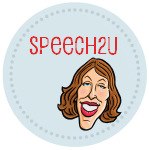Full disclosure: I work in both schools and outpatient settings. In some ways I think this helps give me a unique perspective on both settings. I wrote about this before but I think it bears repeating:
I've admitted in the past that I have made recommendations to parents-with the best of intentions-that have undoubtedly caused my school colleagues headaches. Looking back, I regret these mistakes. It is not the job of the outpatient therapist to TELL the school speech language pathologist what to do. And we need to be careful about what we say to parents in the guise of recommendations.
Sometimes a simple comment is taken to be a recommendation. Here's how a typical conversation might go:
Parent: Joey's been getting in trouble in school.As therapists, we love to make recommendations-we want our clients and students to succeed. But how annoying would it be to have people constantly trying to give you recommendations and suggestions for how you NEED to do your job. Would you like it? Probably not. Do you remember that day in class when they separated all of the students who were hoping to go into a school setting and the professors told them they didn't need to come to anymore classes since they were just going into the schools? Of course not. Because we ALL have the same training and requirements for becoming a speech language pathologist. It may feel good to have a parent ask your opinion or treat you like you are the expert. But it doesn't help our profession or your colleagues in the schools.
Therapist, "Oh no? What's going on?"
Parent: "At snack time, he keeps grabbing other kids crackers."
Therapist, "Have they tried visuals? I know I use this app on my iPad which is great for helping kids to request."
The parent then goes to the school and tells them that they need to buy their child an iPad because their outpatient therapist recommended it.
Taking a weekend CEU course doesn't make you an expert in the field-it just means you have different tools in your toolbox. I think of an expert as someone who teaches a specific technique, has written books or specialized in a certain population. All Speech language pathologists are experts when compared to the general public on speech and language disorders. But most of the SLP's I work with are generalists-meaning that they need to be able to treat a variety of different disorders.
If parents ask me for recommendations related to school or IEP goals, I simply say something along the lines of "I really can't make recommendations for the school since I'm not in the setting and don't know the other teachers and space as well as Mrs X. I'd be happy to contact her and collaborate with her on your son's plan of care." When I talk with the school therapist we discuss each other's goals and what has or has not worked in our therapy sessions. We talk about fun therapy ideas and try to trouble shoot things that are not working. I might ask to see if they've noticed carryover of anything that I'm working on at school or see if they would be open to probing for it-or maybe peeking in a classroom to see if a student is doing it.
When a parent asks you for a recommendation or makes a disparaging comment about the school speech language pathologist take this as an opportunity to educate the parent on the differences between habilitative/medically based therapy and school therapy. Let them know that you have the same credentials as your colleagues in the school and that schools have distinctly different criteria and rules then outpatient settings. As a profession, we are stronger when we are together.
Hope you liked this post. Next week I'm taking the other side with: I feel like you hold the keys to the kingdom. Why won't you let me in?








1 comment:
Thank you for this post! I work in the schools and have seen the good and not so good from outside SLPs. Thanks!
Post a Comment